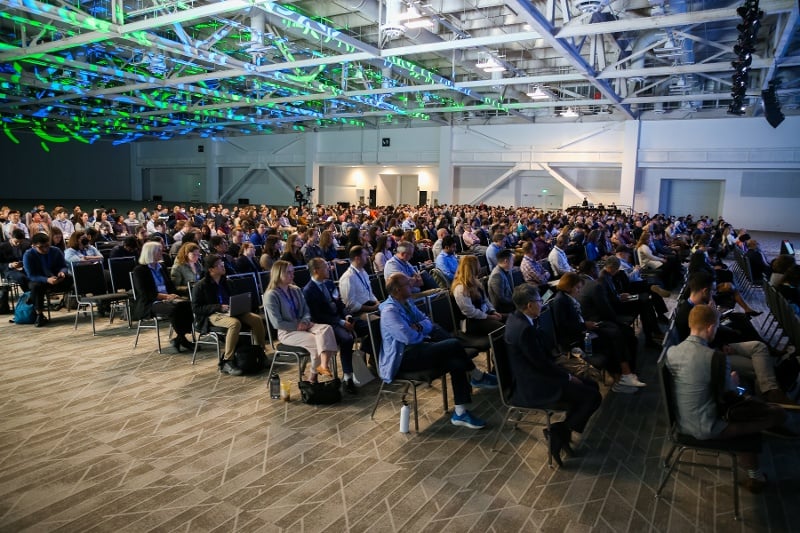Call for Chapter Development Report Reviewers
Want to make an impact? As a CDR reviewer, you’ll evaluate submissions from student chapters and help determine which ones deserve top recognition....
BMES serves as the lead society and professional home for biomedical engineers and bioengineers. BMES membership has grown to over 6,000 members, with more than 160 BMES Student Chapters, three Special Interest Groups (SIGs), and four professional journals.
Welcome to the BMES Hub, a cutting-edge collaborative platform created to connect members, foster innovation, and facilitate conversations within the biomedical engineering community.
Discover all of the ways that you can boost your presence and ROI at the 2024 BMES Annual Meeting. Browse a range of on-site and digital promotional opportunities designed to suit any goal or budget that will provide maximum impact.
The Biomedical Engineering Society (BMES) continues to monitor ongoing developments in federal research funding. We are alarmed by the proposed reductions in critical federal research funding for biomedical engineering.
These proposed cuts threaten healthcare innovation and the biomedical engineering workforce, directly contradicting the Society’s vision: “Health and wellness for all through engineering innovation.”
The proposed reductions will drastically slow the development of life-saving medical technologies, create economic instability, and disrupt research programs.
Consistent federal investment is essential for continued progress in improving our nation’s healthcare and the healthcare system. We urge policymakers to reconsider these proposed reductions. This crucial support directly enables our important work. As biomedical engineers, our work bridges engineering, biology, and medicine, driving innovation in technology, in enhancing medical devices, and in advancing treatments. Through research that integrates engineering principles with biological and medical sciences, we design, develop and improve diagnostics and therapeutics, as well as medical devices and equipment.
Key areas of focus include:
Medical devices and diagnostics (e.g., pacemakers, MRI machines, ventilators, point-of-care diagnostics)
Wearable health devices (e.g., continuous glucose monitors, insulin pumps, smartwatches with ECG capabilities, fitness trackers, remote patient monitoring systems)
Prosthetics and biomechanics (e.g., advanced prosthetic limbs, orthotic devices)
Tissue engineering and regenerative medicine, including stem cell research (e.g., artificial skin, bio-scaffolds for organ repair, stem cell therapies)
Nanomedicine and drug delivery (e.g., targeted drug delivery, nanoscale disease sensors, biocompatible nanomaterials)
Neuroengineering (e.g., deep brain stimulators for Parkinson’s disease, brain-computer interfaces, neural prosthetics)
Surgical robotics (e.g., robotic assisted minimally invasive surgery, surgical planning software)
Bioinformatics and data analysis (e.g., analyzing genomic data for personalized medicine, medical image processing, predictive models for disease outbreaks)
AI in medicine (e.g., AI-assisted diagnosis and drug discovery)
Health systems engineering (e.g., optimizing hospital workflows, improving patient scheduling, designing efficient healthcare delivery systems)
Regulatory science and safety (e.g., developing testing protocols for medical devices, ensuring compliance with safety standards, evaluating the risks and benefits of new medical technologies)
This vast scope of work impacts human life both directly and indirectly throughout our society and over all age groups. Biomedical engineers dedicate their expertise and careers to research and development that is deeply embedded in the fabric of healthcare and wellness.
For example:
Academia: We conduct research that leads to new treatments, products, and services while training the next generation of professionals who make a positive societal impact.
Industry: We help bring innovations to market, scaling up medicines, devices, and technologies that improve human health.
Government: We partner with federal agencies in research, health surveillance, and regulation to advance public health and safety.
Public Policy: We raise awareness, shape policy, and protect intellectual property to support healthcare progress.
To continue the life-changing work of biomedical engineering, consistent federal research funding across all sectors is essential. This investment fuels innovation, technological advancement, and improved healthcare outcomes. This investment generates substantial economic growth as it enhances public health, with each dollar invested in biomedical research yielding roughly $2.46 in economic activity.
Our sister society, AIMBE, has created a useful advocacy toolkit for those wishing to contact local elected officials over this matter. Additional information can also be found on the COGR website. Further, we welcome your comments and support. Please direct your letters to Executive Director & CEO John Falcioni, falcionij@bmes.org.
BMES is at the heart of the biomedical engineering ecosystem—connecting industry, academia, and government. In alignment with our vision and mission, we are committed to advocating for researchers, clinicians, students, innovators, and investors. We call for continued federal support of biomedical research—a central factor for both societal well-being and economic growth.
BMES Executive Committee, February 2025
Dr. Shelly E. Sakiyama-Elbert
Dr. Cynthia Reinhart-King
Dr. Kristen L. Billiar
Dr. Kent Leach
Dr. Donald P. Gaver
Dr. Alisa S. Clyne
The Council of Chairs, the organization comprised of biomedical engineering
department chairs from across North America, endorses
BMES’s public statement, March 13, 2025

Want to make an impact? As a CDR reviewer, you’ll evaluate submissions from student chapters and help determine which ones deserve top recognition....

We’re looking forward to seeing you in San Diego, CA., on October 8-11 for #BMES2025.

We are seeking passionate members to join the prestigious BMES Awards and Fellows committees and play a key role in helping us recognize excellence...

BMES is proud to announce that Linda Griffith, PhD, is the recipient of the Society's highest honor, the 2025 Robert A. Pritzker Distinguished Award...